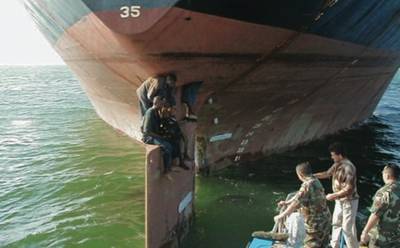Ship Stowaways Expensive & Inconvenient Passengers
The issue of stowaways is one which has existed ever since vessels began to trade. Although the number of people attempting to gain free passage to another country has varied significantly over the years, the problem still remains, says the West P&I Club in a recent loss prevention bulletin, extracted as follows:
In the twelve month period to the end of 2012 the Club handled 51 stowaway cases involving 125 persons. The total incurred value was approximately $1 million and the number of stowaways involved in each incident typically ranged from 1 to 8. However, in one particular case 22 stowaways were found among a cargo of lumber. Although most hid within the deck stow, 2 stowaways concealed themselves inside a cargo hold also containing lumber and suffocated during the voyage due to the oxygen depleting properties of the logs.
Stowaways are expensive to process and repatriate, and it is often necessary to employ escorts to accompany them in transit when they are finally sent home. Vessels may also be delayed and fined. Moreover, it can be difficult to find countries willing to allow stowaways to disembark, particularly if they have no identification documents.
Void spaces around rudder stocks are a popular hiding place for stowaways [see picture].
High risk stowaway areas
In 2010 the International Group of P&I Clubs carried out research which, based on claims experience, identified the top ten ports world-wide in terms of stowaway boardings. All of these ports were in Africa. In addition, IMO conducted a similar study using submissions received from flag states which highlighted certain ports in Belgium, particularly Zeebruge, as attracting a large number of potential stowaways, many of whom were economic refugees from Afghanistan and Iraq.
Stowaway searches
The last line of defence is a thorough search of all parts of the vessel before sailing. Stowaways found while the vessel is in port, in a subsequent port in the same country or within the territorial waters of the country of embarkation are generally regarded as trespassers. In such circumstances it is usually possible to return them ashore at minimal cost and with little or no delay. The P&I Club advises that a comprehensive stowaway search should therefore be carried before the vessel leaves the berth or anchorage.
Source: West of England P&I Club















